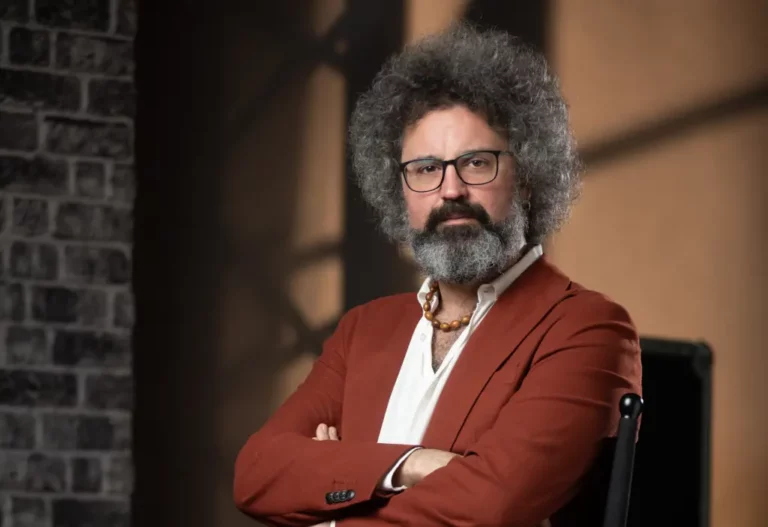Simone Cristicchi is competing at the 75th Sanremo Festival with the song When you are small, which will be contained in “From darkness to light” album to be released on February 14th.
“When you are small” is a song written by the same artist together with Nicola Brunialti, with music made up of Cristicchi and Amara and the arrangements of Francesco Musacco.
To direct the Orchestra of the Sanremo Festival for Simone Cristicchi there will be Maestro Valter Sivilotti.
The story
Simone today organized a press conference during which to present and tell the song he read an excerpt from his latest book “Happynext. In search of happiness “, a story that precedes the writing of the song that will lead to festivals.
Simone, why did you decide to sing this song, “When will you be small”, in Sanremo? With what spirit did you face this choice?
This song is very special for me. It is true life, life lived every day.
It was written during the first quarantine, five years ago, and many advised me not to insert it on the album because it seemed different from the others.
However, I felt that he had a unique potential and that I had to wait for the right time to present it.That moment came thanks to Carlo Conti, who understood his value. It is not just a beautiful song, but a message that talks about real, authentic and lived life. It is a therapeutic song, which I hope can raise awareness of a universal theme: the fragility of the elderly and their return to a state of dependence, like when they were children. It is a little treated theme, but which concerns everyone.
How do you recognize when a song is the right one? What starts inside you?
Inspiration is something magical and transcendent. It can arrive at any time, even when you are overpowering, guiding or walking in a wood.
It is a mystery that concerns the artist's very existence.He tried in this text not to be rhetorical, it takes a moment to expire in the pathetic. We must deal with velvet gloves.
It was not in my idea of taking her to Sanremo was one of the many songs composed for this album.
It was not an easy song to write for me.
We initially focused on tenderness, on taking care of an elderly mother who returns child.
Then, speaking with other people, we felt the importance of also inserting the sense of helplessness and anger that is felt in the face of this transformation.
The song was born like this, with a mix of conflicting emotions.
What left you the recent mystical concert dedicated to Franco Battiato? And why did you choose bitter as a travel companion for the evening of the duets in Sanremo?
The mystical concert for Battiato is a project that has been going on for four years and has had an incredible success. We decided to pay homage to the most spiritual and mystical part of his repertoire, with songs such as “The Cura”. When the time has come to choose who would accompany me to Sanremo, it was natural to think of bitter, my life and travel companion.
The choice of “the care” was almost a moral obligation, given that it is an extraordinary song and had never been performed on the evening of the duets of Sanremo. It is an honor and a great responsibility.
Franco was for me and remains an undisputed master of music and spirituality.
How do you feel to be a “fish out of water” in a festival like Sanremo?
I don't feel out of place because I'm myself. I don't have to recite a part, I bring my purity and sensitivity.
I know the dynamics of the Festival, but I feel I am faithful to myself, and this is my greatest weapon.Sanremo is a mosaic of colors, and I am happy to represent mine.
How do you deal with the expectation of the public who always wants the “classic Cristicchi”?
Don't worry me. I am happy to be myself and to carry on the flag of songwriters.
In recent years, the figure of the singer -songwriter has been a little neglected, but I continue to write songs that speak of real life. I have to do nothing but be faithful to my art.
We feel in this sort of “Indian reserve” which are the songwriters in Sanremo.
What prompted you to release the album “From darkness to light”?
The album had been ready for many years and remained there. I had a serious accident while cutting branches with a chainsaw: I fell and I wounded in my head. When I recovered, the first thought was: “The album”. Maybe it was madness, but I felt I no longer wanted to waste time.
You don't have to be in a hurry to say things.
We must leave a signature of light in the darkness.
The album represents a journey from darkness to light, an inner transformation path.
It is a timeless album and it is my signature of light in these dark times
Where does your empathy come from to the fragiles? Why did you choose to give voice to those who often don't have any?
My empathy was born from an attitude I have had since I was a child. If I had not found an outlet in art, I would have been a very violent and closed boy in myself.
Art was my salvation, and it allowed me to transform pain into light.
I have always heard a strong connection with the excluded, the marginalized and the elderly.
“When you are small” is not the first song I write dedicated to the elderly: there is also “the last waltz”, which tells a love story in a nursing home.
How important was the support of your partner, bitter, on this path?
Bitter was fundamental. If she hadn't been there during the accident, I probably wouldn't be here to speak. He saved my life literally. She is my guardian angel. A gift for my life.
In addition to being my life partner, it is also an extraordinary artist, and his presence has given me an incredible strength.
Our artistic collaboration is an added value that goes beyond a normal relationship.
What is the light in the darkness of the situation you describe in “When you are small”? Is there hope in this song?
Yes, the song gives hope. It is not a crying on you, but a reaction to an inevitable event: the aging of the parents. The light lies in acceptance and the ability to transform pain into something positive.
The song invites you to pay attention, to turn the soul towards others, to get out of your ego and take care of those around us.
What is the final message you want to transmit with your music and your artistic path?
My message is of resistance and hope.
According to the latest statistics, the consumption of antidepressants among the youngest antidepressants has increased and we are in full epidemic of solitude.
Do you think that today the doctors, in addition to drugs, prescribe human relationships.
Yet every generation, like the one before ours, was projected towards tomorrow. He was confident of the future.Today, between nuclear wars at the gates, bloodthirsty crazy and warfondai who govern the world and stupid artificial intelligence we cannot even imagine it, as will our tomorrow be.
And perhaps this is the measure of the disaster.
In my opinion, we have to contrast contrast, have a resistance, resist all this. Nothing that advances.And we can do it in many ways. We can do it focusing on the light, focusing on this small spark of light that is in the dark.
We must find that spark of light that is in each of us and become fragments of light that illuminate the sky.
As San Benedetto by Norcia said: “Only in the dark night the stars shine”.
I believe that today more than ever we must focus on light and humanity, to counteract the darkness that surrounds us.
The evening of the covers
On the evening of the covers Simone Cristicchi will duet with Amara on the notes of “La Cura”, one of Franco Battiato's most loved songs.
Simone Cristicchi and Amara together were guests of the Tenco 2024 prize at the Ariston Theater in Sanremo, where they gave the public an exciting acoustic live of “Take care of me” (song with which Cristicchi won the “Sergio Endrigo” award for the best Interpretation and the “Giancarlo Bigazzi” award for the best musical composition at the Sanremo Festival 2019), “That it is blessed” (song written by Amara with Salvatore Mineo and played by Fiorella Mannoia, ranked in 2nd place at the Sanremo Festival 2017) And, in closing, “The shadow of light”, a tribute to the master Franco Battiato.
The disc
The “eye of God” (Helix Nebula NGC7293) which appears in the album cover, captured by Andrea Arbizzi in a long -awaited summer night, is one of the most spectacular examples of planetary nebula created by a dying star.
A real color painting on the mysterious canvas of the universe, where even a star that has ceased to shine, leaves its light signature in infinite space.
The stars have always attracted us, as well as what is hiding within us.
The same word “desire” (from the Latin de-see) means “lack of stars”. Every time we want something, it is as if a separation from a primordial totality, a nostalgia for the stars, of something distant and inaccessible.
Perhaps our earthly existence is an attempt to fill the abyss that separates us from that invisible world.
“Not nisi in Obscura Sidquito Nocte Micant” left San Benedetto da Norcia, in the cave where he withdrew as a hermit.
“Only in the dark night do the stars shine.”
Perhaps our task is to be able to intercept everything that shines in the darkness, reconnecting to the most authentic part in us: that divine spark that allows us to transhumanar, to go beyond the human, beyond the matter, and also beyond this world.
I thank the de-Siderio who brought me here, who has moved every thought and action.
I thank the invisible energy that supported me every time, one step away from the precipice.
I thank for the immense affection I received and the patience with which you have waited for me, as a photographer awaits for years, before taking an unrepeatable image.
I thank all the people who have unconditionally given me a fragment of self.
The songs I have collected here tell about my life in recent years, my changes, my personal evolution. I am my still amazed gaze.
My bright eye on the world.
My little signature of light in the darkness.
The album contains the single “Il Clandestino” feat. Maurizio Filardo, composed for the TV series of the same name directed by Rolando Ravello starring Edoardo Leo, and two special collaborations: on the notes of “The few things that count” Cristicchi duet with amara (co-author of the text and music of “Le Few things that count “, author and composer of” happens “and co-author of the music of” When you are small “), while Francesco Musacco plays the piano in” I believe “. To embellish the album there is also the poetry of Marco Guzzi entitled “The last lesson”, recited by Cristicchi in the second part of the song “happens”.
This is the tracklist of “From darkness to light”: “When you are small”, “the clandestine” feat. Maurizio Filardo, “I am looking for a word”, “falls”, “the few things that count” feat. Amara, “another us”, “I believe” feat. Francesco Musacco (Piano), “Seven billion of happiness”, “Your eyes”, “litmus”, “happens”, and “from darkness to light”.
The tour
Currently Simone Cristicchi and Amara are engaged in the replicas of the tour “We will return again – mystical concert for Battiato”, which from June 2022 to today has achieved great success for the public and critics, recording numerous sold outs in the most prestigious Italian theaters. From March they will return to the scene and will calm the stage of the Brancaccio Theater in Rome, and then continue in Imperia, Trento, Jesolo (Venice) and, accompanied by symphonic orchestra, in Taranto, Potenza and Matera.
Web & Social
www.simonecristicchi.it
www.facebook.com/simonecristicchciovialpage
www.instagram.com/cristicchi/ www.x.com/Scristicchi
Ph. Giorgio Amendola






